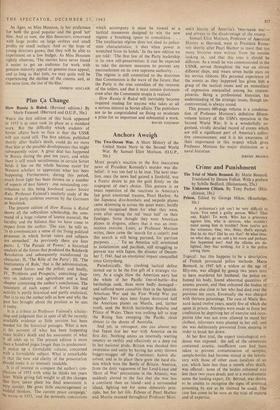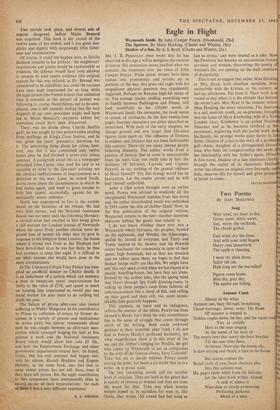Crime and Punishment
The Trial of Marie Besnard. BY Marie Besnard. Translated by Denise Folliot. With a preface by Sybille Bedford. (Heinemann, 25s.) A policeman's job can't be very difficult to learn. You need a guilty person. Who? That one. Right! To work. Who has a grievance against him, who is envious, who wouldn't mind seeing him in trouble? Now you've got the witnesses. One, two, three, that's enough. Did he do this? Did he say that? At what time, on what day, go on, add a bit more and perhaps this happened too? And the villains are de- lighted, they fear nothing, for it is the police asking them.
Topical: but this happens to be a description of French provincial police methods. Marie Besnard, in 1947 left a widow at the age of fifty-one, was alleged by gossip two years later to have murdered her husband; the police ex- humed his body, found abnormal quantities of arsenic present, and then exhumed the bodies of everyone else close to her who had died over the previous ten years. Eventually she was charged with thirteen poisonings. The case of Marie Bes- nard lasted twelve years, nearly five of which she spent in prison. Attempts were made to force her confession by depriving her of exercise and occu- pation (she was not even allowed to mend her clothes), informers were planted in her cell, and she was deliberately prevented from sleeping in order to break her down.
At her first trial, the expert toxicological evi- dence was exposed: the soil of the cemeteries contained arsenic, insufficient care had been taken to prevent contamination of samples, sample-bottles had become mixed in the labora- tory with those of other cases (analysis of an eye, which lasts less than a month after death, was offered: none of the bodies exhumed was les§ than two years dead), and in a melodramatic scene the leading expert, Dr. Beroud, was shown to be unable to recognise the signs of arsenical poisoning by eye as he claimed he could. The case has come to be seen as the trial of experts and of expertise. Two retrials took place, and several sets of experts disagreed, before Marie Besnard was acquitted. This book is her record of the twelve years of her ordeal, and it has great sim- plicity and dignity with surprisingly little bitter- ness and recrimination.
Of course, it could not happen here, as Sybille Bedford remarks in her preface : the neighbours' imputations and gossip would be inadmissible as evidence, the defence would have been allowed tc present its own expert evidence (the original request for this was refused, as Dr. Beroud was considered to be infallible), nor could the accused have been. kept imprisoned for so Long while the legal system (the French believe that unlimited time is essential in the pursuit of justice) was following its course. Nevertheless, not to be com- placent, one is left uneasily feeling that the very dispatch of our own procedure might well have led to Marie Besnard's execution before her innocence could have been discovered.
There was no doubt about Charlie Smith's guilt: he was caught by two policewomen stealing from mailbags on King's Cross Station, and he was given ten years' preventive detention for it. The interesting thing about his crime, how:. ever, was that it was committed. only twelve hours after he had finished a seven-year prison sentence. A paragraph about this in a newspaper disturbed John Carter, who used the case as an occasion to write to the Spectator pointing out the obvious ineffectiveness of imprisonment as a deterrent to this man Later, he visited Smith, learnt more about the circumstances in which he had stolen again, and went to great trouble to help him appeal, successfully, against his un- necessarily severe sentence.
Smith was unprepared to live in the outside world on the Saturday of his .release. He had very little money, and the National Assistance Board was not open until the following Monday; a clerical error had resulted in him' being 'given a rail warrant for London instead of Newcastle where his sister lived; another clerical error de- prived him of money his sister sent by post in response to his telegram from London; the house where a friend had lived at the Elephant had been demolished since he was last there; he thus had nowhere to sleep that night. It is difficult to see What anyone else would have done in the same circumstances.
In The Unknown Citizen Tony Parker has com- piled an unofficial dossier on Charlie Smith. It
is an indictment of a system which can sentence a man to twenty-six years' imprisonment for thefts to the value of £178, and spend as much on keeping him imprisoned as would pay one social worker for nine years to do nothing but study his case.
The failure of prison after-care also caused suffering to Walter Musgrave. In his contribution to Prison (a collection of essays by former de- tainees in a variety of prisons and institutions) he writes justly but almost venomously about how he was caught between an after-care asso- ciation which arranged lodging for him at five guineas a week and the National Assistance Board which would allow him only £3 10s., and how the Employment Exchange and other government departments treated him : he found, tritely, that his real sentence had begun only with his release. Russell Braddon and Eugene Heimler, in the same book, also feel that to some extent prison has not left them, even if they have left prison. But the eight contributors to this symposium have unexpectedly little in accord to say of their incarcerations: for each of them it was a very different experience.
B. S. JOHNSON































 Previous page
Previous page